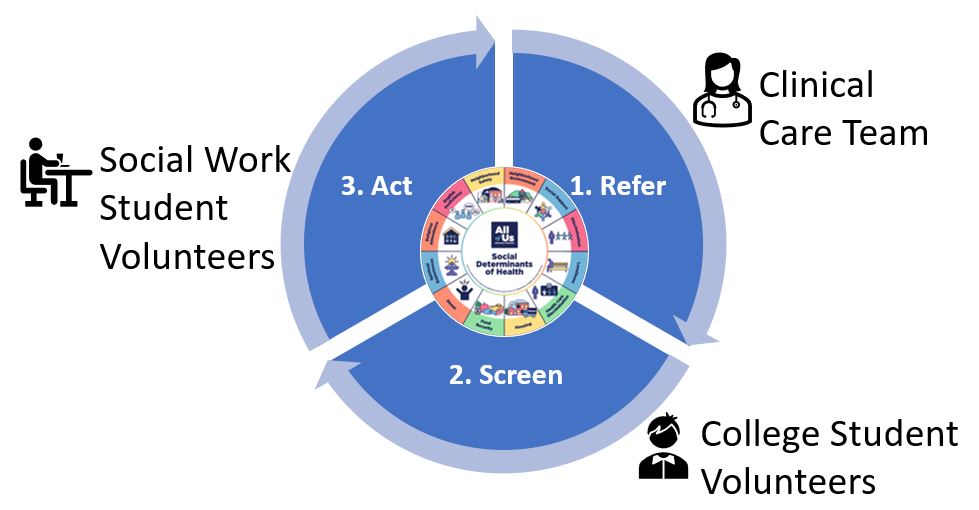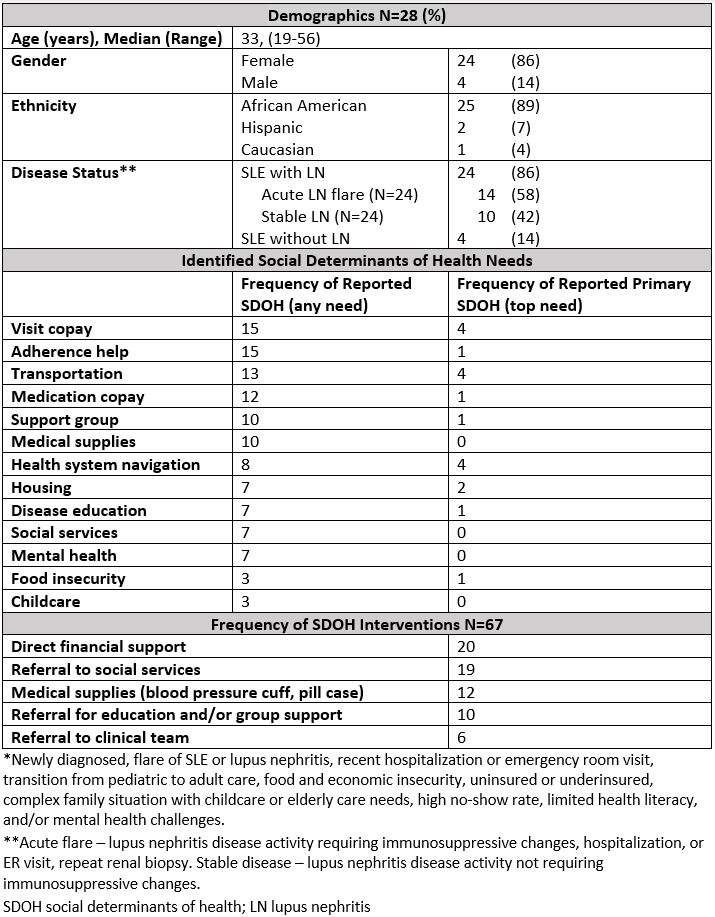Session Information
Session Type: Poster Session A
Session Time: 10:30AM-12:30PM
Background/Purpose: Systemic Lupus Erythematosus (SLE) is a chronic, multisystem autoimmune condition that disproportionally affects individuals from racial and ethnic minority groups with more than 95% of people with SLE reporting one or more social determinants of health (SDOH) challenges. Major SDOH in people with SLE at our institution are unknown. We implemented a Pilot Volunteer Lupus Navigator Program to assess and act upon SDOH among people with SLE.
Methods: Between 7/2022 and 12/2023, we developed a Pilot Volunteer Lupus Navigator Program comprised of volunteer community health workers in an outpatient academic setting across 2 specialties (rheumatology/nephrology) that included 3 phases (referral, screening for SDOH and intervention) among 3 care team groups (medical team, college student volunteers, outpatient social work volunteers). First, participants with SLE or biopsy proven lupus nephritis (LN) were identified by the treating physician as having high SDOH challenges (newly diagnosed or flare of SLE, recent hospitalization or emergency room visit, transitioning from pediatric to adult care, food and economic insecurity, uninsured or underinsured, complex family situation with childcare or elderly care needs, high no-show rate, limited health literacy, and/or mental health challenges). Next, the initial telephone screening for SDOH was performed by volunteer college students. Finally, after screening results were reviewed by the treating physician, the medical team (MD, RN, and/or MA) implemented an intervention plan tailored to individual needs. The physician/medical team placed referrals to a volunteer social services program, offered individual SLE educational sessions, provided medical supplies (BP machines, pill organizers) and/or provided direct financial support. Data are represented as simple counts/percentages.
Results: There were 28 participants. The majority were young women (86% 24/28) who self-identified as African American (89% 25/28) with a history of LN (86% 24/28). The top 3 most frequently requested SDOH were visit copays (15), need for adherence help (15), and transportation (13). The SDOH ranked as top primary needs were transportation, visit copays, and health system navigation. Based on needs identified after screening, patients were offered direct financial support (30%, 20/67), referred to volunteer social services for institutional or community resources (28%, 19/67), received medical supplies (18%, 12/67), or were referred for disease education and/or group support (15%, 10/67).
Conclusion: The Pilot Volunteer Lupus Navigator Program effectively assessed SDOH and demonstrated high medical and social needs among individuals with SLE and lupus nephritis. Cost concerns and health system navigation were major barriers to accessing care. Financial and/or social support were essential. While the model was successful, due to high complexity and volume of SDOH challenges, individuals with SLE may benefit from dedicated social work expertise to improve access to care in SLE.
We acknowledge college student health navigator volunteers Faith S. Ryu, Aylin Ergin, Himanshi Verma, Mia Kim, and Pranav Sai Kancherla for their contributions.
To cite this abstract in AMA style:
Nogueira De Sa P, Wirtshafter S, Geara A, DeQuattro K. Pilot Volunteer Lupus Navigator Program – Leveraging Community Health Workers to Address Social Determinants of Health in SLE [abstract]. Arthritis Rheumatol. 2024; 76 (suppl 9). https://acrabstracts.org/abstract/pilot-volunteer-lupus-navigator-program-leveraging-community-health-workers-to-address-social-determinants-of-health-in-sle/. Accessed .« Back to ACR Convergence 2024
ACR Meeting Abstracts - https://acrabstracts.org/abstract/pilot-volunteer-lupus-navigator-program-leveraging-community-health-workers-to-address-social-determinants-of-health-in-sle/


